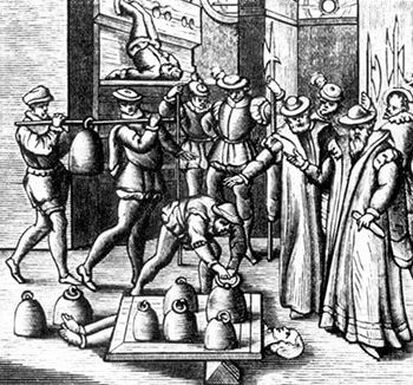...your ancestors could choose death by crushing instead of entering a plea in court! but why would they?If your English ancestors stood trial for a crime in a court of law prior to 1772, the potential punishments - if convicted - could be extremely severe. For instance, when the Gunpowder Plotters were convicted of ‘high treason’ against King James I, they were hung, drawn and quartered. The potential punishments for those convicted of a crime during the Tudor and Stuart era could include - but were not limited to - being beheaded, death by hanging and being put in the stocks, depending on the severity of the crime committed. If prosecuted in a court of law for a capital offence (e.g: murder or treason) during the reign of King George III or a monarch preceding him, your English ancestors would have been faced with a simple choice. To plead ‘guilty’ or ‘innocent’ of the stated crime. Right? Actually, it’s wrong! The choice of plea facing the accused at the start of the trial was not actually a simple binary between ‘innocent’ on the one hand and ‘guilty’ on the other. There was a THIRD option! This is where things get slightly complex. We can safely assume that a plea of ‘guilty’ in a trial for a capital offence would have meant almost certain conviction, death and the subsequent forfeiture of all land and property owed to the Crown. A plea of ‘innocent’ would have either resulted in the previous outcome or, if one was lucky, an acquittal (although this was unlikely in treason cases as these were often a fait accompli). The third option would have appealed to those with significant estates and wealth. To avoid the seizure of all property and estates by the Crown, the accused could refuse to enter a plea. This could result in what was known as peine forte et dure. In English, this meant ‘hard and forceful punishment’. This involved the defendant being subjected to crushing by increasingly heavier rocks; the idea being to elicit a plea from the defendant, which would then result in the trial being resumed. However, if the accused perished during the ‘crushing’ process, they would technically die as an ‘innocent’ person. Therefore, the ‘next of kin’ could inherit the wealth of the deceased, rather than it being seized for the Crown. So, until 1772, the wealthier the defendant in a capital offence, the more incentive they had to refuse to enter a plea. The past was indeed a strange place. Patrick O'Shaughnessy (@historychappy)
0 Comments
Leave a Reply. |
Categories
All
Archives
April 2024
|

 RSS Feed
RSS Feed